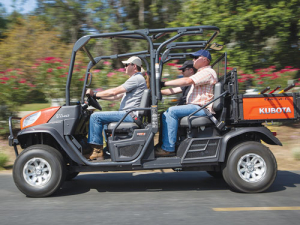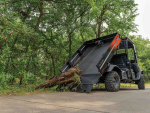The new Kubota RTV-X1140 transforms from a two-passenger vehicle with a large cargo bed to one that carries four passengers and still retains a cargo bed.
The RTV-X1140 makes the switch easily using the innovative K-Vertible cargo conversion system.
This is done in three simple steps: swing in the cargo bed sides, fold the bed up, and flip down the rear seat, which is quickly and easily performed by one person.
The new five-point ROPS design helps increase the RTV-X1140’s workhorse characteristics, allowing for more cargo and side loading, given its hydraulic dump bed with 0.28 cubic metres/0.54 cubic metre capacity, two-seat and four- seat configuration, respectively.
The Kubota liquid-cooled 24.8hp diesel engine drives through a variable hydraulic transmission that offers a wide torque band and large oil cooler that boost’s performance and durability.
Front and rear independent suspension ensures an exceptional ride, along with drivability and handling in most off-road conditions, aided by 275mm of suspension travel that tackles bumps and rugged terrain.
The vehicle’s split-bench style seat is designed for smooth riding, while a digital meter cluster with bright, easy-to-read indicators keeps the operator informed of critical driving conditions, including speed, hours, and kilometres travelled.
Secure lockable storage is provided in a large glovebox on the passenger side and under-seat storage compartments beneath the split-bench.
The RTV-X1140 will start arriving in New Zealand and at Kubota dealers nationwide during March.
www.kubota.co.nz











